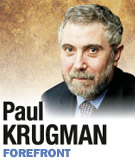Subscriber Benefit
As a subscriber you can listen to articles at work, in the car, or while you work out. Subscribe Now
 “Let me tell you about the very rich. They are different from you and me.” So wrote F. Scott Fitzgerald—and he didn’t just mean that they have more money. What he meant instead, at least in part, was that many of the very rich are deeply distressed when they don’t get the special treatment they consider their birthright; their wealth “makes them soft where we are hard.”
“Let me tell you about the very rich. They are different from you and me.” So wrote F. Scott Fitzgerald—and he didn’t just mean that they have more money. What he meant instead, at least in part, was that many of the very rich are deeply distressed when they don’t get the special treatment they consider their birthright; their wealth “makes them soft where we are hard.”
And because money talks, this softness—call it the pathos of the plutocrats—has become a major factor in America’s political life.
It’s no secret that, at this point, many of America’s richest men—including some former Obama supporters—hate, just hate, President Barack Obama. Why? Because he “demonizes” business—or as Mitt Romney put it last month, he “attacks success.”
Needless to say, this is crazy. In fact, Obama bends over backward to declare his support for free enterprise and his belief that getting rich is perfectly fine. All that he has done is to suggest that sometimes businesses behave badly and that this is one reason we need things like financial regulation. No matter: Even this hint that sometimes the rich aren’t completely praiseworthy has been enough to drive plutocrats wild.
Wait, there’s more. Not only do many of the superrich feel deeply aggrieved at the notion that anyone in their class might face criticism, they also insist that their perception that Obama doesn’t like them is at the root of our economic problems. Businesses aren’t investing, they say, because business leaders don’t feel valued. Romney repeated this line, too.
This is also crazy. There’s no mystery about the reasons the economic recovery has been so weak. Housing is still depressed in the aftermath of a huge bubble, and consumer demand is being held back by the high levels of household debt that are the legacy of that bubble. Business investment has actually held up fairly well given this weakness in demand.
But never mind. Because the rich are different from you and me, many of them are incredibly self-centered. They don’t even see how ridiculous they look when they attribute the weakness of a $15 trillion economy to their own hurt feelings. After all, who’s going to tell them? They’re safely ensconced in a bubble of deference and flattery.
Unless, that is, they run for public office.
Like everyone else following the news, I’ve been awe-struck by the way questions about Romney’s career at Bain Capital, the private-equity firm he founded, and his refusal to release tax returns have so obviously caught the Romney campaign off guard. Shouldn’t a very wealthy man running for president—and running specifically on the premise that his business success makes him qualified for office—have expected the nature of that success to become an issue?
What’s now apparent is that the campaign was completely unprepared for the obvious questions, and it has reacted to the Obama campaign’s decision to ask those questions with a hysteria that surely must be coming from the top. Clearly, Romney believed that he could run for president while remaining safe inside the plutocratic bubble and is both shocked and angry at the discovery that the rules that apply to others also apply to people like him.
Fitzgerald again, about the very rich: “They think, deep down, that they are better than we are.”
OK, let’s take a deep breath. The truth is that many, and probably most, of the very rich don’t fit Fitzgerald’s description. There are plenty of very rich Americans who have a sense of perspective, who take pride in their achievements without believing that their success entitles them to live by different rules.
But Mitt Romney, it seems, isn’t one of those people. And that discovery may be an even bigger issue than whatever is hidden in those tax returns he won’t release.•
• Krugman is a New York Times columnist. Send comments on this column to [email protected].
Please enable JavaScript to view this content.
